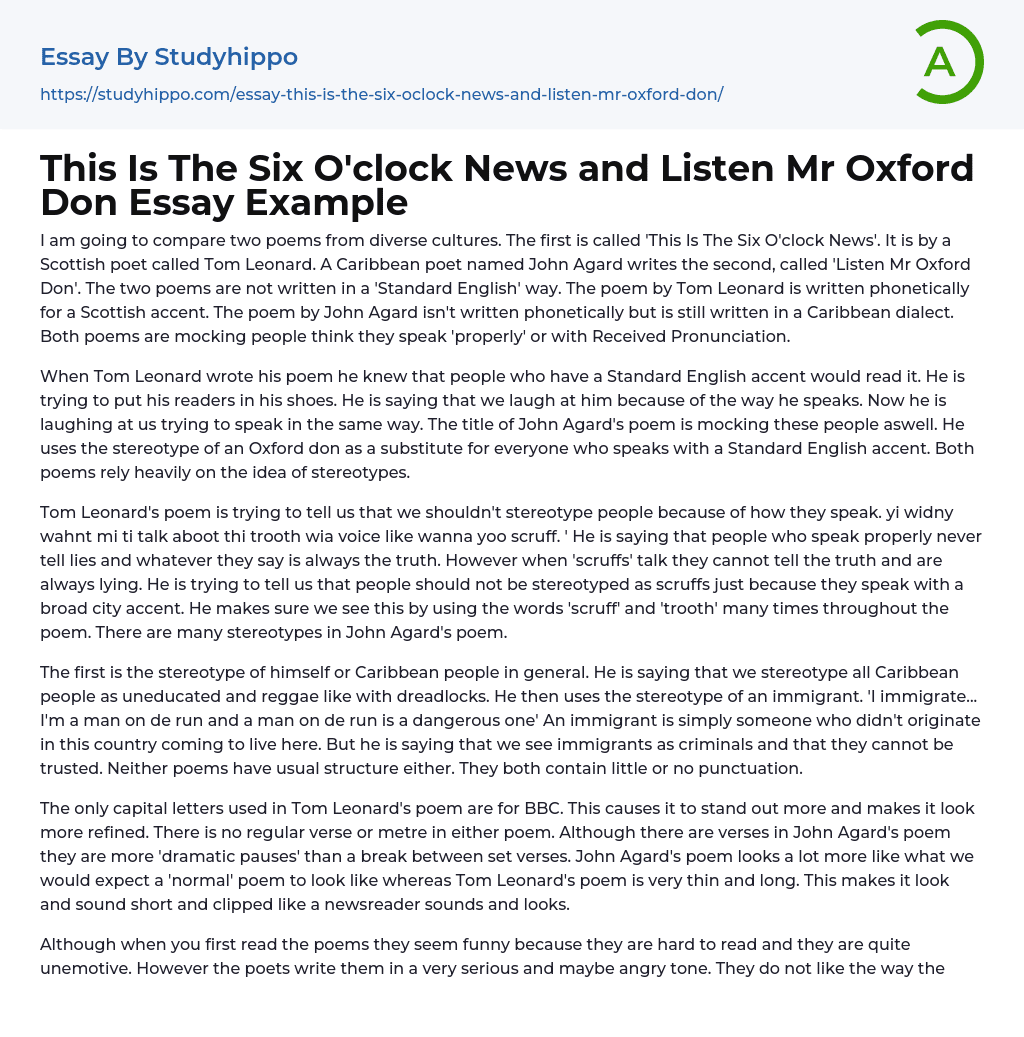

This Is The Six O’clock News and Listen Mr Oxford Don Essay Example
I am going to compare two poems from diverse cultures. The first is called 'This Is The Six O'clock News'. It is by a Scottish poet called Tom Leonard. A Caribbean poet named John Agard writes the second, called 'Listen Mr Oxford Don'. The two poems are not written in a 'Standard English' way. The poem by Tom Leonard is written phonetically for a Scottish accent. The poem by John Agard isn't written phonetically but is still written in a Caribbean dialect. Both poems are mocking people think they speak 'properly' or with Received Pronunciation.
When Tom Leonard wrote his poem he knew that people who have a Standard English accent would read it. He is trying to put his readers in his shoes. He is saying that we laugh at him because of the way he
...speaks. Now he is laughing at us trying to speak in the same way. The title of John Agard's poem is mocking these people aswell. He uses the stereotype of an Oxford don as a substitute for everyone who speaks with a Standard English accent. Both poems rely heavily on the idea of stereotypes.
Tom Leonard's poem is trying to tell us that we shouldn't stereotype people because of how they speak. yi widny wahnt mi ti talk aboot thi trooth wia voice like wanna yoo scruff. ' He is saying that people who speak properly never tell lies and whatever they say is always the truth. However when 'scruffs' talk they cannot tell the truth and are always lying. He is trying to tell us that people should not be stereotyped as scruffs just because they speak with
broad city accent. He makes sure we see this by using the words 'scruff' and 'trooth' many times throughout the poem. There are many stereotypes in John Agard's poem.
The first is the stereotype of himself or Caribbean people in general. He is saying that we stereotype all Caribbean people as uneducated and reggae like with dreadlocks. He then uses the stereotype of an immigrant. 'I immigrate... I'm a man on de run and a man on de run is a dangerous one' An immigrant is simply someone who didn't originate in this country coming to live here. But he is saying that we see immigrants as criminals and that they cannot be trusted. Neither poems have usual structure either. They both contain little or no punctuation.
The only capital letters used in Tom Leonard's poem are for BBC. This causes it to stand out more and makes it look more refined. There is no regular verse or metre in either poem. Although there are verses in John Agard's poem they are more 'dramatic pauses' than a break between set verses. John Agard's poem looks a lot more like what we would expect a 'normal' poem to look like whereas Tom Leonard's poem is very thin and long. This makes it look and sound short and clipped like a newsreader sounds and looks.
Although when you first read the poems they seem funny because they are hard to read and they are quite unemotive. However the poets write them in a very serious and maybe angry tone. They do not like the way they are treated by certain types of people and are trying to put their point
across. They are trying to tell us that they are persecuted because of the way they speak and that they shouldn't be. John Agard's whole poem is about him being a wanted man. But he is wanted because he doesn't speak with a 'proper' accent. 'Dem accuse me of assault on de Oxford dictionary'
He is saying that all he does is speak with a different dialect to other people but because this isn't seen as 'normal' he is committing a crime. The poets know that there is a strong connection between the way they speak and their personal identity. But what they are trying to tell us through their poems is their personal identities aren't just how they speak. There is a lot more to them than just how they speak, and that just because their dialect is the first thing we find out about them, they shouldn't be judged wholly on this.
- National News essays
- The view essays
- Dialect essays
- English Language essays
- Second Language essays
- Semiotics essays
- Sign Language essays
- Spanish Language essays
- Collaboration essays
- Dialogue essays
- Fake News essays
- Journalism essays
- Mass Media essays
- Media Analysis essays
- Media Bias essays
- Media Studies essays
- Message essays
- News essays
- Propaganda essays
- Radio essays
- Rogerian Argument essays
- Role of Media essays
- Social Media essays
- Social Media Marketing essays
- Social Networking essays
- Youtube essays
- Allegory essays
- Alliteration essays
- Comedy essays
- Comic book essays
- Drama essays
- Dystopia essays
- Fairy Tale essays
- Fantasy essays
- Fiction essays
- Ghost essays
- Gothic Fiction essays
- Gothic Literature essays
- Irony essays
- Legend essays
- Memoir essays
- Novel essays
- Poetry essays
- Satire essays
- Science Fiction essays
- Short Story essays
- The western essays
- Tragedy essays
- Witchcraft essays



